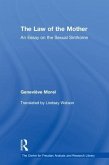
Gebundenes Buch
Psychoanalytic Theory and Intersectional Politics
22. März 2022
Taylor & Francis
| Broschiertes Buch | 35,99 € | |
| eBook, ePUB | 33,95 € | |
| eBook, PDF | 33,95 € |

8,99 €
inkl. MwSt. und vom Verlag festgesetzt.
Sofort per Download lieferbar
4,49 €
inkl. MwSt. und vom Verlag festgesetzt.
Sofort per Download lieferbar
9,99 €
inkl. MwSt. und vom Verlag festgesetzt.
Sofort per Download lieferbar
Broschiertes Buch
Psychoanalytic Theory and Intersectional Politics
22. März 2022
Routledge / Taylor & Francis
Ähnliche Artikel

Gebundenes Buch
An Essay on the Sexual Sinthome
27. November 2018
Taylor & Francis Ltd (Sales)


Gebundenes Buch
Kant, Sade and Lacan on the Ethical Functioning of the Unconscious
19. November 2021
Taylor & Francis

18,99 €
Versandfertig in 1-2 Wochen


Gebundenes Buch
Blake, Bolte Taylor, and the Myth of Creation
5. Juli 2019
Taylor & Francis


Gebundenes Buch
Further Notes on the Child
14. Juni 2019
Taylor & Francis
Ähnlichkeitssuche: Fact®Finder von OMIKRON
